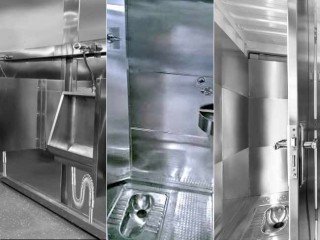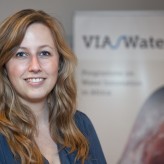Project Results:
The goal of GARV was to pilot smart, portable, indestructible and bio toilets in the urban slums Accra, Ghana. The toilet design includes use of stainless steel as raw material ensuring that the toilets are vandalism proof and are easily maintainable in a cost-effective manner. Use of software and sensor technology with the toilets ensures that toilets are maintained regularly and malfunctioning parts are replaced quickly. Moreover, the toilets are equipped with bio-digester tanks so that the faecal matter is disposed through a bacterial action resulting in an odorless-colorless liquid that could be used as a pesticide spray in local farms.
GARV applied for VIA Water support to test their innovative toilet design and their bold business idea of making the toilets free of charge for the users. They planned to do it by earning revenues through multiple sources including advertisement revenues from corporate clients (especially ones involved with hygiene products) by building business kiosks outside the toilet blocks to be operated by local youth; sale of toilet paper rolls. These ideas were further refined as the company ventured into the communities and started understanding their needs. Due to difficulties with local governing bodies and local private operators, the toilet blocs were not implemented, and the business model could not be tested.
Key Results
- Interest generated from 9 district assemblies in Ghana about piloting technologies for improved sanitation
- Research concluded that more than 80% of people are willing to pay for better services for water, sanitation and hygiene
- Two research reports published with the Institute of Rural Management Anand (IRMA), Gujarat.
- Employment created for 32 people directly and 48 people indirectly
Tips for the future
- Receive on-ground support that can deal with emerging issues in real-time
- Make regular calls for project updates
- Opportunities for connections with investors, introductions and follow-up of project
Potential for growth
Scaling and replication can be done if there is
- Advocacy at the federal government level to get the project approved and introduced through a policy document to avoid corruption nexus at the district assembly level
- Funds raised to set up centres across multiple districts and support them for 18-24 months until it generates operational profits & recovers investors’ money
Project partners
Snapex Overseas
Period
1 November 2018 - 20 May 2019
Location
Accra, GhanaLast project updates
No updates yet
Background
Shared Sanitation, Public Toilets, Community Toilets, et al, are a very common sight in most of the urban slum communities of the developing world. While, an emerging economy like India which has been all ‘gung-ho’ about achieving the ODF status under the “Clean India Campaign” by 2019, finds itself 76% behind the scheduled target in the URBAN areas and is still figuring out the best models to provide decent toilet facilities to all; about three-fourths of the urban population in Ghana relies on shared sanitation
facilities. Various reports suggest that about 70% of urban communities in Ghana use Pay-Per-Use Public Toilet facilities, which probably is the highest number of any urban area in the world. Development professionals, and governments would have a sparkle in their eye looking at this figure, wherein it would be said that most of the people in urban areas have access to toilets. On the contrary, Ghana is struggling with newer challenges which are emanating out of poor maintenance of toilets, absence of hygiene education and community participation, absence of government standards, guidelines and the ever popular political “Toilet Wars”. Research studies and investigations by various agencies reveal that the available public toilets mostly lack basic facilities like, adequate ventilation, lighting, often have incomplete structures or vandalized infrastructure. Most of the toilets are not maintained properly with foul smell emanating from the complexes, urine and fecal matter can be seen floating outside the facilities.
A world bank report suggests that Ghanaians spend about $400 million to use the public toilets, wherein the costs varies between 50-80 pesewas per use across all neighborhoods. Even the district assemblies are duped of the revenues by the people managing the toilets for their own selfish interests as they keep greater part of the proceeds with themselves.
We believe that an alternative complete sanitation solution which is eco-friendly and self-sustainable can be implemented successfully in partnership with local organizations in Ghana. An introduction of GARV- SMART PORTABLE BIO-TOILET COMPLEXES in urban areas of Ghana, free of charge to the BoP communities is capable of presenting itself as a scalable PPP model in this context.
Project Plan
GARV tries to address few of the main problems related to the proper functioning of public toilet infrastructure, primarily being vandalism and poor-maintenance. This is achieved through use of appropriate raw materials in manufacturing of toilets and integration of software, sensor based technology for monitoring of proper maintenance.
Following points explain our innovation in detail:
✓ GARV Toilets provide end-to-end public sanitation solutions through SMART PORTABLE TOILET CABINS, which are made from stainless steel.
✓ All the fittings and accessories in the toilet (which are stainless steel) are either welded or joined with hidden nuts and bolts. These specifications enable the toilets to be indestructible (no vandalism), have highest shelf life and minimal recurring costs.
✓ These units are pre-fabricated modular enclosures which can grouted to the ground in a civil platform and be placed adjacent to each other to form a toilet block. ✓ The toilets are self-sustainable in terms of energy-usage and waste-disposal.
✓ They are equipped with Solar Panels (with Battery Packs) which further powers the LED Lights, exhaust fans and sensors inside the toilet.
✓ For Waste-disposal in places where sewage lines are not available, the toilet cabins are equipped with Bio-Digester Tanks. These tanks decompose the fecal matter through a bacterial action and the only output obtained is an odorless, colorless liquid, which can further be used as a pesticide spray in farms.
✓ A unique insulation technology enables the cabin to maintain an ambient temperature in extreme climates.
✓ GARV provides various models catering to different user segments, special models for Women “Toilets For Her” are equipped with Sanitary-Pad Vending Machines and Incinerators. DisabledFriendly toilets are designed with international guidelines, with ramps, rails and instructions guides.
✓ GARV Toilets are equipped with smart technologies, like sensor based flushing systems which clean the toilet floor and lavatory pan, pre-and-post every usage.
✓ RFID and IoT sensors ensure that the implementing agencies get the real-time data updates with respect to any malfunctioning equipment in the toilet. The real-time report also updates the dashboard with health/hygiene related data of users, like how many users have used the toilet, how many of them used the flush, or how many of them used the soap dispensers/sanitizers etc.
✓ These data updates help the project implementing agencies in designing the behavior change communication plans for the local communities with more precision.
✓ Toilet facilities can generate revenues for funding the operations and maintenance activities such that the users are not burdened for paying up heavily for usage.
Our primary business idea for the pilot project in Ghana, remains that the underserved communities get “free-access to state of the art, well-maintained and sleek toilets” which have all basic facilities inside the toilet block. When we mention free-access, we don’t want to disturb the existing public toilet market with a subsidy. Instead, by subtly changing the business model and integrating the toilet hardware with software technology we intend to have multiple revenue streams out of the toilet block which compensate for the revenue lost in user charges. Multiple revenue streams could include the following:
1. Advertising Revenues: Providing the outer panels of toilet blocks for advertising to various corporates, it could be companies selling Hygiene products, FMCG, Telecoms etc. Alternatively, this space could also be provided on rent to the government bodies which may use it to advertise government schemes.
2. Revenues Through Business Kiosks: We intend to build small business kiosks outside the toilet blocks which would be operated by local youth employed with GARV Toilets. These kiosks would act as Community Service Kiosks for the local slum community, providing multiple services like mobile recharges, lottery sales, bank outlet services, doling out government schemes/subsidies etc. GARV Toilets would generate revenue out of commissions provided by partner companies/agencies.
3. Sales of Toilet Paper Rolls: Though at present the community toilets in Ghana charge for the low-quality toilet paper rolls with the user charge which is 0.5 Gh Cedi to 0.8 Gh Cedi, we plan to sell premium toilet paper rolls at 0.2 Gh Cedi.
4. Sales of Treated water/pesticide: The bio-digester treatment of waste provides us with a pesticide liquid or an option of treated water which could further be used by Metropolitan assemblies in farms or other purposes. Revenue through the sales of pesticide is an added advantage for GARV for taking care of the sustainability and profitability aspects of the project.
Target group
Communities residing in slums of urban, peri-urban areas in and around Accra, local metropolitan and district assemblies, local NGOs and large private corporations.
Sustainability
Our project adapts through the FIETS sustainability framework, as the various possible results and impacts through our project are explained in the following manner:
- Financial Sustainability:
Our project aims to be financially self-sustainable by generating revenues through multiple revenue streams and providing a range of services through business kiosks established outside the toilet blocks. Also, these activities need to be undertaken for offering clean toilet facilities to patrons at a bare-minimum or no charge basis.
- Institutional Sustainability
In the long-term we intend to establish contracts with local governments under Public-Private-Partnership Modes for commissioning of toilet blocks and taking care of the operation and maintenance as well. Through this we want to replicate our India model in Ghana’s context and ensure that all our eco-system partners including the government bodies leverage on each other’s synergies and offer a win-win opportunity for all stakeholders, wherein the government’s objectives of putting up well-maintained public toilets are fulfilled through GARV and its partners.
- Environmental Sustainability
GARV products are designed to be eco-friendly and self-sustainable such that the surrounding environment is not degraded in any manner possible. It is evident from the use of raw materials solar panels, energy-efficient LED lights, electrical accessories, or sensors. Stainless steel fittings and the design of toilets ensures that a lot less water is used for cleaning and maintenance purposes when compared to the conventional structures. Moreover, the toilets are equipped with Bio-Digester tanks so that the fecal matter is disposed through a bacterial action and the only output is an odorless-colorless liquid which could be used as a pesticide spray in farms.
- Technological Sustainability
GARV is an award winning social innovation, where the Toilet infrastructure has been reimagined in terms of providing well-maintained and self-sustainable toilets to the BoP communities. The toilet designs and use of stainless steel as raw materials ensure that the toilets can’t be vandalized and are maintained easily in a cost-effective manner. The use of software and sensor technology ensures that toilets are maintained regularly and the malfunctioning equipment is rectified as soon as possible.
- Social Sustainability
The basic premise behind the innovation of GARV toilets was to address the problem areas of public toilet facilities, due to which the existing facilities are lie defunct and communities are left with the option of open defecation. GARV toilets take care of all the basic facilities that should be available in a public toilet, be it proper ventilation, lighting, ergonomics, soap dispensers, sanitizers and even wash basins are provided inside the toilet cabin. Various models catering to the needs of all sections of society ensure that requirements of Women folk, or the physically challenged are take care of through essential accessories provided inside the toilet cabins. Clean Toilet facilities provided at bare minimum or no-charge basis, makes sure that the facilities are used by patrons on a regular basis and doesn’t put any financial burden. Monitoring of health/hygiene practices of users through remote-monitoring software enables us to work along with the communities in educating them about use of available facilities in promoting a healthy society.
Overview of Goals
To evaluate and develop an eco-friendly, sustainable and alternative business model for public sanitation solutions through innovative, smart and participatory approach. GARV toilets wants to ensure:
1. Participation of BoP communities, corporates, government departments for implementation of scalable PPP public sanitation projects.
2. Toilet operations are streamlined and operating expenditures are brought to minimal levels.
3. Waste disposal is efficient, on-site and eco-friendly.
4. Improvement in health, hygiene and financial parameters of the user community.
5. Extension of community services from government and offerings from corporates are integrated through smart toilet infrastructure on the site.



